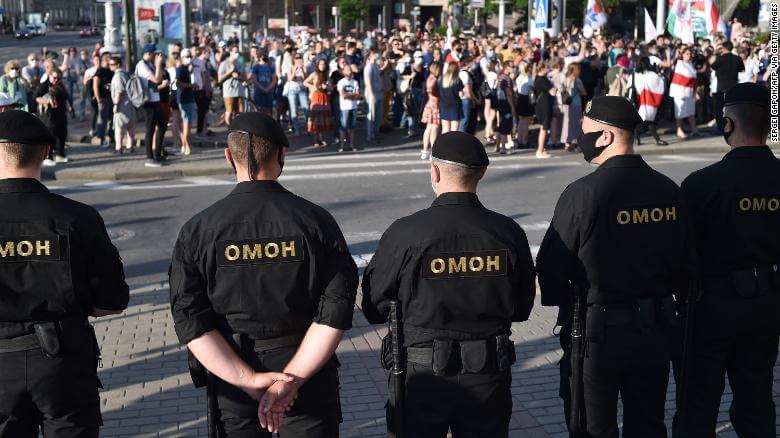NEW YORK (June 23, 2020) — This past weekend, Belarus was shaken by an unprecedented wave of protests in response to the arbitrary arrest of Viktar Babaryka, the leading opposition candidate in the country’s upcoming presidential elections.
Babaryka was looking to challenge Belarus’s dictator, Alexander Lukashenko, who has ruled this European country since 1994. Babaryka was on his way with his son to deliver the signatures required to register for the election when he was arrested on suspicion of financial crimes. Babaryka had collected over 430,000 signatures — more than four times the required number, and a record for Belarus.
As a result of the arrest, thousands of Belarusians took to the streets of Minsk on Thursday evening, forming a human chain several miles long. Protests spread across the country on Friday, but this time the police were prepared. The government shut down mobile internet connections, and closed metro stations across the capital. Plainclothes riot police tore into crowds and seized protesters at random, packing them into the back of unmarked vans and leaving many beaten and bloody. Among those arrested were journalists from Reuters, Radio Free Europe, and the Polish station Belsat TV.
“For years Lukashenko has tried to convince the West that he is slowly moving away from Putin’s Russia. The latest events in Belarus suggest that he has no interest in reform,” said HRF president Thor Halvorssen. “I urge Lukashenko to reconsider his precarious position.”
Babaryka’s arrest was only the latest instance in a series of high-profile arrests of Belarusian opposition leaders. In May, Sergei Tikhonovsky, a popular YouTube blogger, was arrested on dubious charges, and has since been placed in solitary confinement. He became popular after organizing a series of demonstrations around Belarus, during which people waved slippers and referred to Lukashenko as a “cockroach” to be crushed. Though the arrest was supposed to make Tikhonovsky ineligible to run for president, his campaign has continued under the name of his wife, Svetlana, who managed to collect the required 100,000 signatures to register herself as candidate for the election in his place.
Much of the frustration expressed by Belarusians in recent weeks seems to be the result of the government’s handling of the coronavirus crisis. President Lukashenko dismissed the virus as a “psychosis” and encouraged Belarusians to fight it by drinking vodka and going to the sauna. World Health Organization guidelines were not implemented, professional sports carried on with spectators in attendance, and the government held a large parade to mark the 75th anniversary of Victory in Europe Day — the celebration of the formal acceptance of Nazi Germany’s unconditional surrender to the Allied powers in 1945. Now, Belarus has over 60,000 confirmed cases of the coronavirus in a country of only nine million people, while the World Bank expects the country’s economy to contract by four percent.
“Lukashenko has ruled Belarus since 1994. In that time, he has never faced serious opposition to his rule in the run-up to an election. The scale of the demonstrations now in response to massive repressions, point to the fragility of his regime,” said Michelle Gulino, HRF International Legal Associate. “Lukashenko won’t be able to soothe tensions with the promise of stability. Belarusian officials must immediately release opposition activists and refrain from committing acts of violence.”
The Human Rights Foundation (HRF) is a nonpartisan nonprofit organization that promotes and protects human rights globally, with a focus on closed societies.
